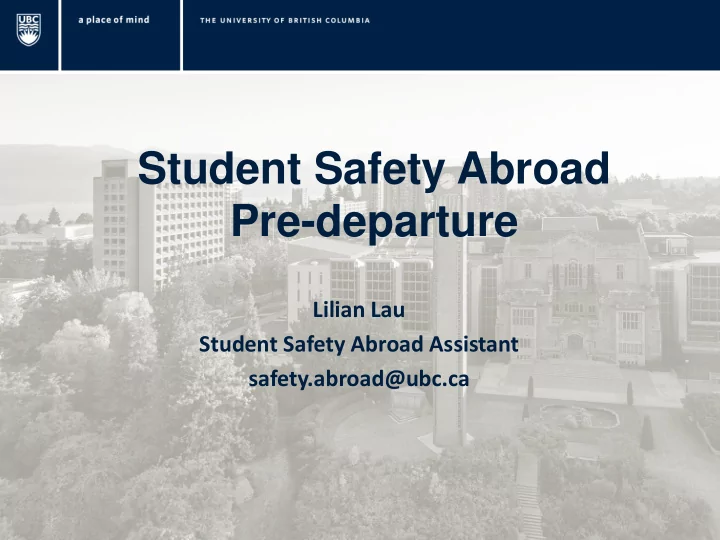

Student Safety Abroad Pre-departure Lilian Lau Student Safety Abroad Assistant safety.abroad@ubc.ca
Nepal Earthquake 2015 • April 2015 (magnitude of 7.8), an aftershock in May 2015 (magnitude of 7.3) • UBC students in rural areas of Nepal – Far away for local airport – Telecommunications cut off for some time Taken by Daniel Berehulak for the New York Times
Student Safety Abroad Policy • UBC Policy 69 – Created for safer experiences travelling abroad • All students that are conducting university activity abroad must: – Complete the Safety Registry – Complete additional safety planning documents if going to higher risk areas • Records in the Safety Registry allow the university to identify and contact students as soon as possible in any given location
Emergencies Before leaving: • Think about possible emergencies that may occur • Print and complete your Emergency Wallet Card • Familiarize yourself with your insurance plan – Review policies, bring proper documentation, and know the correct number to call
Emergencies During an emergency on your trip: • Contact local authorities or your host organization for immediate assistance (e.g. local police, the Canadian consulate) • Contact UBC Campus Security (1-604-822-2222) ▫ Available 24 hours a day, 7 days a week ▫ Campus Security will contact appropriate university personnel
Emergencies Other important contacts: • Medi-Assist for medical emergencies (AMS/GSS) ▫ Connects you to appropriate facilities (e.g. nearest hospital) ▫ 1-888-699-9333 or 1-604-419-4487 • DFATD Emergency Watch and Response ▫ 1-613-996-8885 sos@international.gc.ca ▫ Specific to Canadian citizens • Registration for Canadians Abroad ▫ travel.gc.ca/travelling/registration ▫ Specific to Canadian citizens
Travel Health & Medical Insurance Three types of insurance Basic Extended Emergency • Required • Required • Recommended • Provided by the • Prescription, dental, • Includes medical province in Canada vision evacuation, (MSP in BC) ▫ In-country emergency surgery, • Travel repatriation ▫ In- and out-of- ▫ Out-of-country country ▫ Plan-by-plan basis
Travel Health & Medical Insurance • AMS / GSS plan covers Extended and Emergency insurance: – 120 days for duration, before, and after • Inform IHaveAPlan if you are leaving for more than 120 days – Up to $5 000 000 per incident – Includes hospital, physician, and other services for emergency treatment – Does NOT apply to students returning to their home country – Policy number: E043979, ID number: student number • Visit ihaveaplan.ca for details
Travel Health & Medical Insurance • Vaccinations – Travel Clinic – Vancouver Coastal Health (Broadway & Ash) – AMS/GSS plan covers up to $150 • Medication – Contact foreign government offices to confirm status of your medication – Obtain a travel supply of medication – Pack medication in their original labelled containers – Carry an extra prescription – Become familiar with what medication is available abroad and how you are going to fill a prescription (if needed) – travel.gc.ca/travelling/health-safety/medication
Third Party Authorization • Without Third Party Authorization, UBC cannot give out any information about you – including your family! • Go to Student Service Centre to complete the authorization • Update your emergency contacts on SSC as well
Quick Recap • Campus Security 1-604-822-2222 – On your Emergency Wallet Card • Insurance details and policies • Third Party Authorization
Registry • Records in the Safety Registry allow the university to identify and contact students as soon as possible in any given location • This is especially important if you are going on a university activity unrelated to Go Global! – We have no or very little information otherwise • Website: safetyabroad.ubc.ca
Registry
Registry
Registry
Registry
Registry
Registry
Registry
Registry
Registry
Registry
Registry • Recap of key information that you may need time to look for: – Nature of activity and UBC contact – Travel insurance • Provider and policy number – Host organization details • Main contact in the foreign country – Address and contact number abroad • Where are you staying? – Additional contact abroad if available
Passports & Visas • Some countries require a valid passport for 6 months • Check the Department of Foreign Affairs, Trade and Development website for specific country requirements – travel.gc.ca – Specific to Canadian citizens • Check foreign embassies and consulates in Canada – international.gc.ca
Additional Resources • Student Safety Abroad website – safetyabroad.ubc.ca – Learning modules – emergencies, trip planning, health – Emergency wallet card, pre-departure checklist • DFATD Country Travel Reports & Advisories – travel.gc.ca • Student Safety Abroad email – safety.abroad@ubc.ca
Questions?
Recommend
More recommend